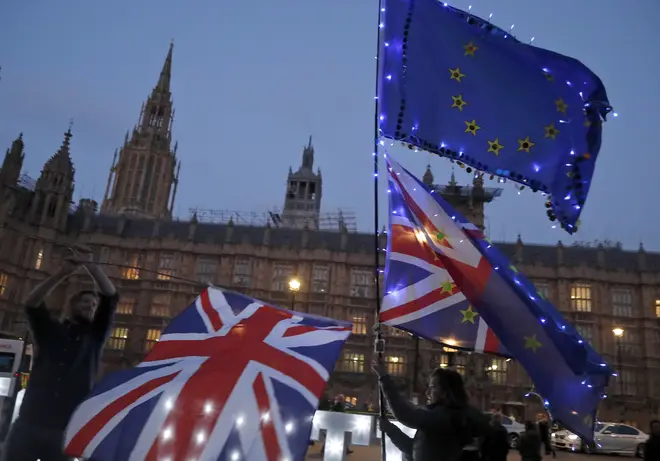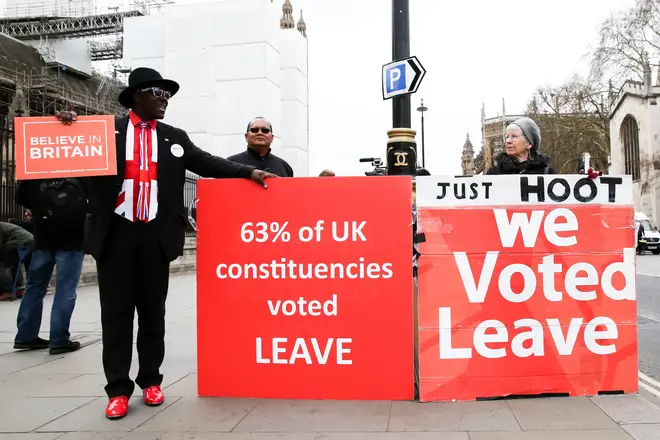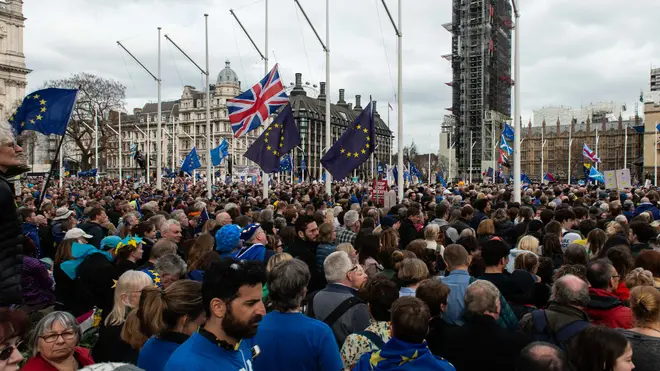
James O'Brien 10am - 1pm
28 March 2019, 07:52 | Updated: 28 October 2019, 15:53

A way forward for Brexit remains unclear, with both Theresa May's deal and alternative options suffering major setbacks last night.
After the Prime Minister offered to resign if her withdrawal agreement was approved - around 20 eurosceptic Tory MPs switched their support to back the deal.
But the DUP then said they will continue to oppose it because of concerns around the Irish border backstop. Without support from the DUP, it is very difficult for Mrs May to get her deal through the House of Commons.
Then last night was meant to be the time that Parliament took over the Brexit process and held a series of indicative votes. The only problem was MPs rejected all eight alternative options put in front of them.
So what happens next as the government attempts to break the Brexit deadlock?
One or more of these scenarios could play out in the coming days.
- Put Theresa May's deal to a third meaningful vote (MV3)
- More indicative votes
- No-deal Brexit on 12th April
- Request a long extension to Article 50
- Revoke Article 50
- Second Referendum
- General Election
Theresa May still hopes to pass her withdrawal agreement, but after two heavy defeats, she has said she will only bring it back for a third time if she's confident of victory.
After Mrs May promised to stand down if her deal is passed, she convinced many of the Conservative Brexiteers to get on board. But the DUP still insist they will not vote for it and that leaves her short on numbers to get it through.
To meet the EU deadline of extending the Brexit delay to 22nd May, this needs to pass by 29th March, so if she has the numbers, she will bring it back to the house. The decision for this needs to be made by 5pm today.
MPs voted last night on eight alternative paths for Brexit - and they rejected them all.
The two votes that got the most votes were a confirmatory referendum on with withdrawal agreement - meaning the public would have a vote on the final Brexit deal - and membership of a Customs Union.
Oliver Letwin, whose bill allowed MPs to take control of Brexit, says they will debate the options further and will have another series of votes on Monday to try to get a consensus on the way forward.

In law, the default option if the UK doesn't agree a withdrawal agreement on Brexit, then we will leave without a deal on 12th April.
However, parliament has voted against the idea of a no-deal Brexit a number of times. While it is still an option, the Prime Minister has said she won't take us down this route without the say-so of MPs.
If Theresa May can't get her deal through by 29th March, she can request a long extension to Article 50. This will mean the UK will have to take part in the European elections on 22nd May.
That would require the backing of all 27 European Union countries, but European Council President Donald Tusk tweeted yesterday to encourage them all to accept this.
Appeal to EP: You should be open to a long extension, if the UK wishes to rethink its strategy. 6 million people signed the petition, 1 million marched. They may not feel sufficiently represented by UK Parliament but they must feel represented by you. Because they are Europeans.
— Donald Tusk (@eucopresident) March 27, 2019
Almost 6million people have signed the petition to revoke Article 50 and remain in the European Union, making it the most popular government petition of all time.
Joanna Cherry tabled a motion in last night's indicative votes asking for Article 50 to be revoked if no deal is passed, but it was defeated 184 to 293.
Only a couple of weeks ago, this seemed very unlikely, but last night 184 MPs voted for this option. A bill would need to go through parliament to allow this to happen.

This is also an option gaining momentum, with huge crowds attended a march last weekend for it in central London.
Last night's motion on a second referendum was contingent on Theresa May getting her deal through parliament. It was defeated by 27 votes, which is progress for advocates of a second referendum, up from 85 earlier this month.
With pollster Sir John Curtice suggesting that Remain would win a second referendum, some pundits has suggested that Brexit is no longer the will of the people.
Parliament has clearly shown that with the current arithmetic, no form of Brexit can be agreed. The only way that can be changed is a General Election.
That would allow a new government with a majority to get a deal through the House of Commons. It may be the only way to solve the current Brexit deadlock.
However, with Theresa May already announcing that she will step down, would the Conservatives allow her to lead them into an election without a succession plan? It also leaves the door open for Jeremy Corbyn to become Prime Minister and that is something that many Tories fear more than anything else.
It would be the most mental election *ever*:
— Steven Swinford (@Steven_Swinford) March 27, 2019
* Voters would have no idea who Tory leader would ultimately be
* Voters would have no idea whether we're actually leaving the EU
* And God only knows knows what Brexit policies Labour & the Tories would put in their manifestos...
Stay tuned to LBC for the very latest in what happens with Brexit - on your radio, on mobile or say "Play LBC".